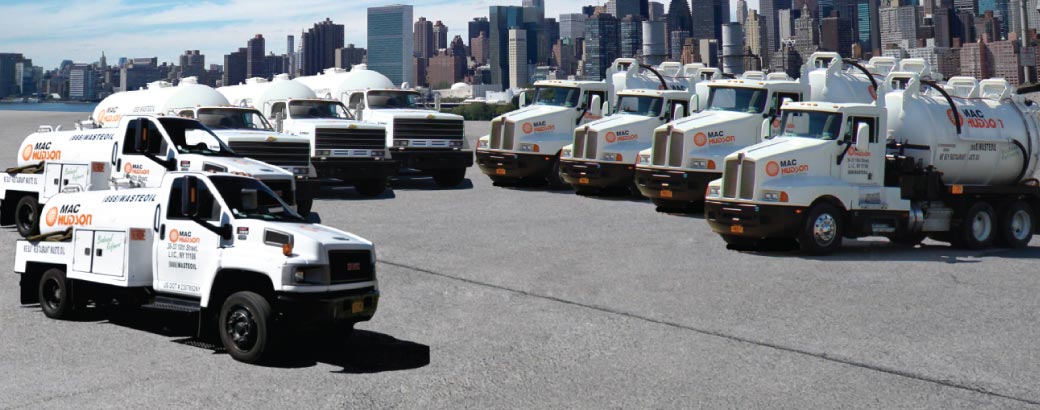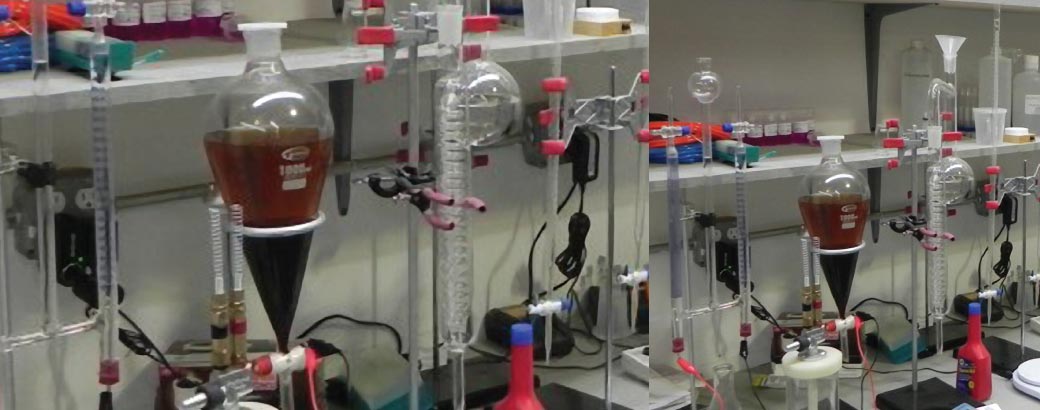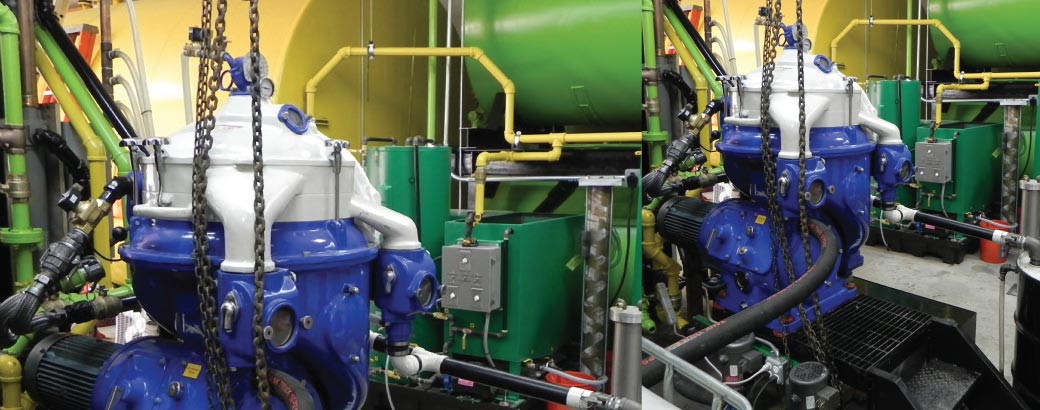MAC HUDSON INDUSTRIES is a state of the art biodiesel refinery. We are the sole refinery in New Jersey and one of three in the state of New York. Our equipment includes 3 biodiesel reactors and a computerized centrifuge that is able to spin the oil at a rate of 20,000 times the force of gravity, which is crucial in separating the water and other impurities out of the waste vegetable oil. We focus highly on this process as the cleaner the oil, the better the biodiesel quality. This centrifuge can clean approximately 16 million gallons of waste oil a year.
Mac Hudson Industries takes great pride in having a less than 5% waste out of our refinery. The byproduct of making biodiesel is glycerol (glycerin + methanol) reclaim the methanol for re-use, and take what’s remaining – the glycerin - and make natural soap.
Our research and development lab is constantly striving to make a higher quality biodiesel.
Mac Hudson Industries is a family owned and operated business.


Mac Hudson Industries pick-up service makes it easy for your establishment to recycle your used or waste cooking oil.
First, we will supply your establishment with a FREE appropriate-sized container and/or a secured container should you store your waste oil outside (to avoid theft of the oil).

The collection option is yours! You are free to call us when your container is full or you can place your establishment on a scheduled route-pick up. Depending on the location of your establishment, scheduled route pick-ups can vary.
We will pay you a competitive price for your waste oil depending on quantity, quality and market value. We mail payments every 1st and 15th day of every month.
However, under no circumstances can the oil we collect have a disproportionate amount of water and/or food scraps.

We set ourselves apart through our innovative, proprietary based customer tracking system, guaranteeing a hassle free service.
We track customer disposal habits allowing Mac Hudson Industries to coordinate scheduled and timely pick-ups.
With theft of waste vegetable oil on the rise, this process will also allow us to be alerted should these patterns deviate, allowing us to take precautionary actions.
NO MORE GREASE COATED BINS!
Our drivers are instructed to clean grease bins and surrounding areas after every pickup. Our quality assurance team ensures drivers are completing pick-ups appropriately and punctually.

The National Biodiesel Board describes Biodiesel as “America’s first Advanced Biofuel”. They go on to say “It is a renewable, clean-burning diesel replacement that is reducing U.S. dependence on imported diesel, creating green jobs and improving our environment. It is made from an increasingly diverse mix of resources including agricultural oils, recycled cooking oil and animal fats and meets the strict specifications of ASTM D6751.” For more information, go to www.biodiesel.org.
Biodiesel can be used as a fuel for vehicles in its pure form, but it is usually used as a diesel additive to reduce levels of particulates, carbon monoxide, and hydrocarbons from diesel-powered vehicles. Biodiesel is the most common biofuel in Europe. Biofuels provided 2.7% of the world's transport fuel in 2010.
Biodiesel runs in any conventional diesel engine. No engine modifications are necessary to use biodiesel.
Biodiesel dramatically reduces harmful emissions that cause environmental problems such as global warming, acid rain and smog. Biodiesel reduces CO2 emissions by over 78% compared to petroleum diesel. Even blended with petroleum diesel, biodiesel significantly reduces emissions. Furthermore, the plants used to make biodiesel feedstock absorb more CO2 as they grow than the biodiesel produces when it is burned. This means that in the lifecycle of biodiesel production and use no new carbon byproducts are created.
Biodiesel is made through a chemical process called transesterification whereby the glycerin is separated from the fat or vegetable oil. The process leaves behind two products -- methyl esters (the chemical name for biodiesel) and glycerol (a valuable byproduct usually sold to be used in soaps and other products). Biodiesel is better for the environment because it is made from renewable resources and has lower emissions compared to petroleum diesel. It is less toxic than table salt and biodegrades as fast as sugar. Since it is made in the USA from renewable resources such as soybean oil and canola oil, its use decreases our dependence on foreign oil and contributes to our own economy.
Health problems as a result of emissions exposure are also greatly reduced by the cleaner emissions of biodiesel. According to the American Lung Association biodiesel emissions are 90% less toxic than petro-diesel and will reduce incidents of health hazards such as asthma, emphysema and lung cancer.
Biodiesel is a renewable fuel source. Unlike fossil fuels, biodiesel is made from vegetable oilseed crops grown in America, which replenishes the market annually with renewable feedstock.
Biodiesel can be stored anywhere that petroleum diesel fuel is stored. All diesel fueling infrastructure including pumps, tanks and transport existing trucks can be used with biodiesel.
Biodiesel has superior lubrication quality than that of diesel fuel. It increases engine life and can be used to replace sulfur, the acid-rain-causing lubricating agent in petroleum diesel.
Engines running on biodiesel run normally and have similar fuel mileage to engines running on diesel fuel. Auto ignition, fuel consumption, power output, and engine torque are relatively unaffected by biodiesel.
Biodiesel is recognized by the EPA as an alternative fuel and is the only alternative fuel that has successfully completed Tier I and Tier II Health Effects Testing under the Clean Air Act and meets clean diesel standards established by the California Air Resources Board.
Biodiesel has a pleasant aroma in comparison to the toxic smell of petroleum diesel fuel.
Biodiesel is safer to transport. Biodiesel has a high flash point, or ignition temperature, of about 300 degrees F compared to petroleum diesel fuel, which has a flash point of 125 degrees F.
Biodiesel can be used alone or mixed in any amount with petroleum diesel fuel. A 20% blend of biodiesel with diesel fuel is called "B20," a 5% blend is called "B5" and so on.
Biodiesel is rapidly biodegradable and non-toxic. Biodiesel handling and use is far less damaging to the environment than petroleum fuel, and is particularly superior in the event of a spill or leak.
Biodiesel is domestically produced. Biodiesel benefits American farmers, American businesses and the national economy. Job creation, new markets for domestic agricultural products and keeping our energy dollars domestic are just a few of the many economic benefits gained by using biodiesel instead of imported petroleum diesel.
Biodiesel saves money. Engines running on biodiesel have been shown to need less maintenance. Also, biodiesel use allows federal fleet managers to keep existing equipment on the road longer and still adhere to new, stricter emissions standards.
See the studies and learn more about this great fuel at: www.biodiesel.org.
fact Biodiesel is a cleaner-burning alternative fuel for diesel engines. It reduces greenhouse gas emissions by more than 75% and particulate matter more than 90% compared to petroleum diesel, helping to fight global warming & acid rain.
fact Instead of drilling for petroleum, we can recycle waste fats and used cooking oil into quality biodiesel.
fact Biodiesel has a 78 percent life cycle carbon dioxide reduction, according to the U.S. Departments of Agriculture and Energy. This takes into account everything from the field to the fuel tank.
fact International Energy Agency data shows global biofuels production has cut consumption of crude oil by 365 million barrels per year, offering savings of $43.8 billion dollars a year.
fact Biodiesel produced in the U.S. in 2008 displaced the equivalent of 38.1 million barrels of crude oil.
fact Even replacing just 5 percent of today’s diesel fuel would equal the same amount of diesel fuel that we refine from the crude oil imported from Iraq.
fact The U.S. biodiesel industry is creating green collar jobs and making positive contributions to our economy and the environment. In 2008 alone, the biodiesel industry supported 51,000 jobs in all sectors of the economy; added $4.287 billion to the nation’s GDP; and generated $866.2 million in tax revenue for local, state and the federal government.
factBiodiesel, long-range EPA and NREL studies show a 78% reduction in overall life-cycle carbon emissions.
factAccording to the EPA and DOE, even corn ethanol, the least efficient of the biofuels family, creates 1.2 units of energy for every one unit used. In the case of soy-bean oil biodiesel the fuel creates 4.5 times the amount of energy than was used to make it. In the case of waste cooking oil based biodiesel, which is what we sell here at Tri-State Biodiesel, each unit of energy used to create the fuel yields a life-cycle equivalent of 5.5 units of energy!
factCorn ethanol (one of many biofuels), not Biodiesel, is a minor contributor to rising food costs. There are many factors associated with rising food costs in the US, which include: growing demand driven by China and India, currency valuation differentials, weather conditions, global consumption habits, cattle farming, and fuel costs to name but a few. With soy-biodiesel, the food part of the bean is still used for food, so soy-biodiesel actually encourages more food production. With waste cooking oil, and animal fat derived biodiesel, we are actually making fuel out of a waste product.
factAccording to the FAO, in the 15 years from 1990 to 2005, the time period of the emergence of the biofuels into the world market, global deforestation has actually declined by 18%. In fact, in Brazil, which comprises over 50% of the world's rainforests and is a global leader in biofuel production, rainforest deforestation rates have dropped sharply in the past four years by 56% in parallel with a marked 119% boom in the biodiesel and fuel ethanol industries. In other leading rainforest nations, such as India – a world leader in biofuel production – reported forest growth is occurring in tandem with significant development in its fuel ethanol industry. Globally, rainforest deforestation has decreased with an increase in biofuel demand and production.
We Collect ALL used and waste vegetable oils including, but not limited to, canola oil, soy bean oil, peanut oil, coconut oil, olive oil, corn oil.
RECYCLE YOUR USED COOKING OIL
Earn MONEY for your waste fryer oil!! Mac Hudson Industries pays YOU when we collect your used cooking oil. Call us at (888) WASTEOIL to find out more!
It’s THE LAW. In New York City, Department of Environmental Protection (DEP) regulations mandate the proper disposal of waste cooking oil in restaurants and other public establishments. Increasingly, New Jersey municipalities are requiring that restaurants dispose of their waste cooking oil in the proper fashion. The State of New Jersey has mandated by law that municipalities comply as of 2012 with the “Recycling Enhancement Act” N.J.S.A. 13:1E-00.16. Mac Hudson Industries will provide you with all necessary documentation to prove your establishment is complying with these laws.
It’s good for the ENVIRONMENT. When you recycle your used vegetable oil, not only are you helping maintain the health of your local sewer system, you are also contributing to the production of alternative fuels like biodiesel. These alternative fuels reduce the U.S.’s reliance on foreign oil and ultimately reduce harmful carbon emissions into the environment produced by traditional gasoline
We will pick up your Waste Cooking Oil on a one time or regular schedule.
Call (888) WASTEOIL (888) 927-8364
Click Here to Schedule a pick up online.
SORRY, WE CAN NOT EXCEPT PARTIALLY HYDROGENATED, FULLY HYROGENATED FATS, or SHORTENING!
Mac Hudson Industries has future employment opportunities that include but not limited to:
Please feel free to inquire for more information via our Contact section here.
Mac Hudson Industries Corp. is a state of the art biodiesel refinery. We are the sole refinery in New Jersey and one of three in the state of New York. Please give us a call, email us (on the right of the page) or to schedule a pickup request click here
MEMBER OF THE
NATIONAL BIODIESEL
BOARD
BIC LICENSE NO. 4391
NYS DEC NO. 4A-638
T: (888) WASTEOIL - (888) 927-8364
T: (212) WASTEOIL - (212) 927-8364
F: (212) 202-6448
E: info@machudson.com
GREATER NYC OFFICE
29 Springbrook Lane
Hillsdale, NY 12529
NYC OFFICE
36-31 10th Street
Long Island City, NY 11106
REFINERY
219 N 12th Street
Newark, NJ 07107
Mac Hudson Industries offers FREE pickup of used cooking oil.
We service all of Manhattan, Brooklyn, Queens, Staten Island, Bronx, Westchester, Nassau, Suffolk as well as New Jersey (NJ).
The oil is processed and recycled to be used in many applications, including biodiesel.
The Department of Environmental Protection (DEP) regularly inspects restaurants for compliance in their waste cooking oil disposal methods. Mac Hudson Industries will provide you with the necessary receipts to prove that your establishment maintains proper disposal practices. Please maintain these receipts on-site to demonstrate consistent service.
The best method for storage of WVO is a 55 gallon steel drum. If you do not have a drum, one can be provided by Mac Hudson Industries. These drums are brand new, 55 gallon steel containers with locking clamp lids, and measure approximately 3 feet tall and 2 feet in diameter. We can also pick up used oil stored in the 5 gallon (totes) containers in which the oil is purchased. However, this method generally increases pickup time, and can lead to a messy recovery.
Because 100% of the WVO collected by Mac Hudson Industries goes directly to biodiesel fuel production, it is VERY IMPORTANT that you do not put Trap Grease in your WVO container. Trap grease must be stored separately from your cooking oil or Mac Hudson Industries will be unable to remove it. If you need your grease traps cleaned, please let us know and we will make other arrangements.
For additional inquiries, please call (888) WASTEOIL or (888) 927-8364 to speak with a customer service representative.